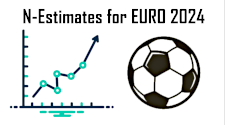
Quintessa mathematicians and scientists enjoy analysing numbers, and at least some of them love sport. Our ever-popular sports team rating algorithm was used to forecast results for UEFA 2020 and the FIFA World Cup in 2022; now, with UEFA Euro 2024 approaching fast, the algorithm is being fired up once more!
In late 2019, Quintessa reported the development of a novel algorithm (“N-Estimates”) to assess the overall standard, or “rating”, of a sporting team. As well as calculating a team’s rating, the approach can be used to predict upcoming results. It has previously been used to predict scores for UEFA Euro 2020 and the FIFA World Cup in 2022. Now, we present predictions for the group stages of UEFA Euro 2024. The N-Estimates algorithm uses a mathematical model that is tuned to historical results and considers effects such as home advantage and opposition strength. Using this, the algorithm derives a probability distribution of the performance of a team on a given day, from which the mean “rating” is also calculated. When predicting match results, the distributions of the two teams are converted to a probability distribution of goal difference. An appraisal of both teams’ recent results is also undertaken, allowing the probabilities of different scorelines to be calculated. The most likely scoreline (accounting for the probabilities of both the number of goals scored and the goal difference) is taken as the predicted match result. Since the 2022 World Cup, adjustments have been made to the calculation of uncertainties on these scores and the goal difference.
This information is displayed in the prediction plots below. The x- and y-axes represent potential numbers of goals scored by the "home" and "away" teams respectively, with the home wins below the diagonal black dashed line and away wins above (except for matches involving host nation Germany, no home advantage is applied and the designation of a “home” team is arbitrary). The colour scale represents the normalised probability of each result, with a high probability plotted in orange and a low probability in blue. The most likely result is highlighted by the black crossed-circle.
In the opening stage of the tournament, teams will be competing in six groups of four. Each team will play the other three teams in their group giving a total of six matches per group. There are hence 36 results to predict. Predictions will be added throughout the group stage to allow the results of earlier matches to be taken into account. Who will be happiest after the group stage? The algorithm expects group-topping performances from Germany, Spain, England, France, Belgium and Portugal.




































Predictions for the Euro 2024 group stages. For each plot, the circles represent possible final scores, with the number of goals scored by each team plotted on the axes. Each circle has been colour coded to indicate the probability of that result occurring, with the most likely outcome marked with a black cross. The dashed black line indicates a goal difference of zero.
Originally published 13th June 2024.
Updated 18ᵗʰ June 2024 to add predictions for match 2 for Groups A-C.
Updated 19ᵗʰ June 2024 to add predictions for match 2 for Groups D-F.
Updated 21ˢᵗ June 2024 to add predictions for match 3 for Groups A-C.
Updated 24ᵗʰ June 2024 to add predictions for match 3 for Groups D-F.
Quintessa is not affiliated in any way with UEFA. Its application of the N-estimates algorithm to the UEFA Euro 2024 competition is an independent and non-commercial endeavour.